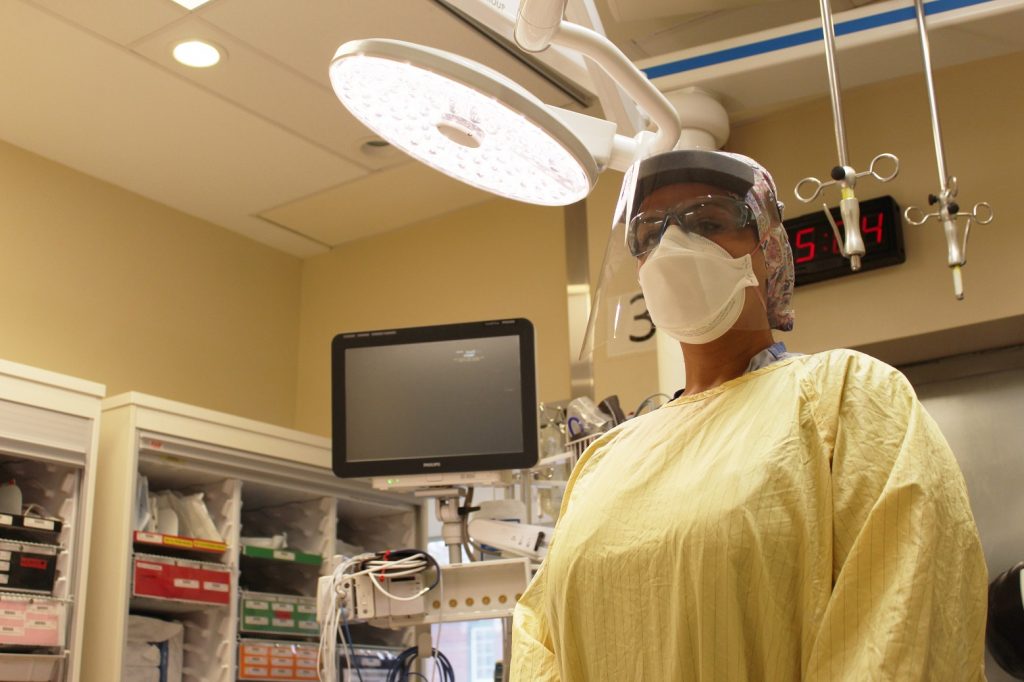
A letter from a frontline hero – Dr. Simerpreet Sandhanwalia
This has been a year unlike any other…
My name is Dr. Simerpreet Sandhanwalia, and I am an Emergency Department physician at Hamilton Health Sciences (HHS).
And I am so proud of the way our community has come together and responded to the COVID-19 pandemic challenges. Everyone was supportive in their own way – from providing Personal Protective Equipment (PPE) and donations, to practicing physical distancing and doing their part to prevent hospitals from being overwhelmed. Lives have been saved because of this teamwork and collaboration. We are truly all in this together.
Providing the most compassionate care possible
At the height of the first wave of the COVID-19 pandemic, it was gut-wrenching to call a family member to tell them that their husband, wife, mom or dad was about to die, and connect them via phone or tablet due to the no-visitor policy. These conversations were held with many families, not just those with COVID-19. The mental and emotional anguish of providing care this way was so difficult for everyone: the families, patients and the health care teams.
But we are passionate and dedicated to helping people and doing what we can to provide patients with the most compassionate care possible. This is not just our commitment, it is our calling.
Supporters make a difference
That’s why I’m writing this letter. Generous supporters of Hamilton Health Sciences Foundation have made an incredible difference not only to countless patients and their loved ones, but also the frontline caregivers such as myself.
Being vigilant for ourselves, our patients, colleagues and our families is mentally and physically exhausting. Some of us did not eat or drink during our eight-hour shifts to avoid contamination. Donning PPE takes time. We changed in our garages or on porches before entering our homes to avoid bringing our work clothes inside. We would not kiss or hug our children and partners for fear of making them sick.
PPE has of course been absolutely essential to form a barrier to protect patients and clinical teams. But this necessary equipment also impacts our ability to make a personal connection with a patient. You can see the sadness and fear in the eyes of patients and their loved ones – it’s very hard for them to feel our caring and compassion when they can’t see our faces beneath the masks. We hope they can see it in our eyes the way we can see and feel theirs.
“At the height of the first wave of the COVID-19 pandemic, it was gut-wrenching to call a family member to tell them that their husband, wife, mom or dad was about to die, and connect them via phone or tablet due to the no-visitor policy.”
Emotional and exhausting
During these past few months, I have encountered some very difficult situations as a physician in the Emergency Department. When one COVID-19 patient went into respiratory distress, her wish was not to have a breathing tube. Her son didn’t live nearby, and when we contacted him, he understood the gravity of the situation. He asked me to tell her that he loved her – and I used my phone so he could tell her himself. It was a very sad moment.
Support from thoughtful donors has helped make that care possible. Donor funds have helped purchase things like smartphones, tablets, walkie-talkies and plastic cases to protect the technology, along with SIM cards for phones so that patients can connect with their families. Vital medical equipment such as ventilators, defibrillators and ICU beds are critical to providing care. Patients have been very thankful that we were there for them and able to provide care during this challenging time.
It has been emotional and exhausting. But we are getting through this together. Our wonderful staff members are here to support one another. This experience has taken teamwork to a whole new level.
Sincerely,
Dr. Simerpreet Sandhanwalia
Emergency Department Physician
Hamilton Health Sciences
